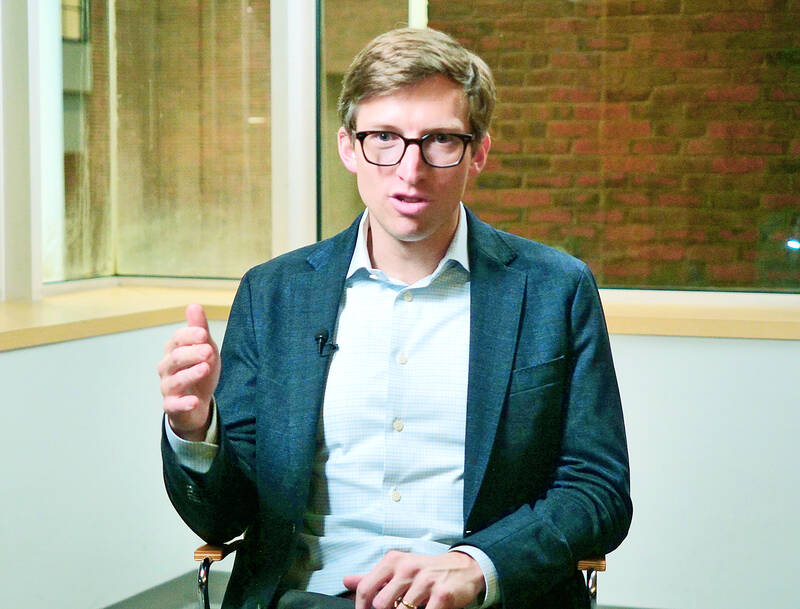Higher production costs and differing work cultures are unlikely to be decisive in the success or failure of Taiwan Semiconductor Manufacturing Co’s (TSMC, 台積電) expansion into the US, said Chris Miller, the author of Chip War: The Fight for the World’s Most Critical Technology.
In a recent interview, Miller, an associate professor at Tufts University’s Fletcher School of Law and Diplomacy, said that while Taiwan’s successful “model” in the chip industry is unlikely to be reproduced, Taiwanese companies still have to globalize their production in order to remain competitive.
To that end, TSMC has launched plans to build plants in Dresden, Germany, the US state of Arizona and Japan’s Kumamoto Prefecture.

Photo: CNA
The Arizona project in particular has faced a string of setbacks, including higher-than-expected costs, complaints by US employees of a “brutal” corporate culture, and construction delays at both factories it is building.
Despite these challenges, Miller said he disagreed with the notion that there is anything uniquely difficult about building chips in the US, adding that Samsung Electronics Co and Texas Instruments Inc both operated profitable plants there.
Intel Corp has also built chip plants in the US, and while they have had problems recently, those have mainly been related to design rather than construction, he said.
In terms of workplace culture, Miller said that leading countries in chip production — beginning with the US in the 1950s, then Japan and now Taiwan and South Korea — have always touted their respective work culture as being the best suited for the industry.
“It seems to me that the chip industry shifts too rapidly to have culture be a really effective explanatory factor,” Miller said.
Rather, in order to succeed, the onus is on companies to make sure that their work culture fits, or is capable of “assimilating,” in different geographies, he said.
Miller was also skeptical of the argument that higher production costs in the US would prove a major obstacle.
“TSMC’s success internationally has not been due to cost efficiency. It’s been due to better technology,” he said.
“I think over-focusing on cost underestimates what makes the Taiwanese workforce so effective,” which is related not to low wages, but the fact that they are highly skilled, he said.
Overall, Miller said he was waiting to see how TSMC worked through other challenges related to its US expansion, including making the Arizona facility work within its broader business.
As it does so, TSMC, as well as competitors Samsung and Intel, are all likely to receive assistance in the form of billions of dollars of US government subsidies, stemming from the Creating Helpful Incentives to Produce Semiconductors and Science Act in 2022, Miller said.

SEMICONDUCTORS: The German laser and plasma generator company will expand its local services as its specialized offerings support Taiwan’s semiconductor industries Trumpf SE + Co KG, a global leader in supplying laser technology and plasma generators used in chip production, is expanding its investments in Taiwan in an effort to deeply integrate into the global semiconductor supply chain in the pursuit of growth. The company, headquartered in Ditzingen, Germany, has invested significantly in a newly inaugurated regional technical center for plasma generators in Taoyuan, its latest expansion in Taiwan after being engaged in various industries for more than 25 years. The center, the first of its kind Trumpf built outside Germany, aims to serve customers from Taiwan, Japan, Southeast Asia and South Korea,

POWERING UP: PSUs for AI servers made up about 50% of Delta’s total server PSU revenue during the first three quarters of last year, the company said Power supply and electronic components maker Delta Electronics Inc (台達電) reported record-high revenue of NT$161.61 billion (US$5.11 billion) for last quarter and said it remains positive about this quarter. Last quarter’s figure was up 7.6 percent from the previous quarter and 41.51 percent higher than a year earlier, and largely in line with Yuanta Securities Investment Consulting Co’s (元大投顧) forecast of NT$160 billion. Delta’s annual revenue last year rose 31.76 percent year-on-year to NT$554.89 billion, also a record high for the company. Its strong performance reflected continued demand for high-performance power solutions and advanced liquid-cooling products used in artificial intelligence (AI) data centers,

Gasoline and diesel prices at domestic fuel stations are to fall NT$0.2 per liter this week, down for a second consecutive week, CPC Corp, Taiwan (台灣中油) and Formosa Petrochemical Corp (台塑石化) announced yesterday. Effective today, gasoline prices at CPC and Formosa stations are to drop to NT$26.4, NT$27.9 and NT$29.9 per liter for 92, 95 and 98-octane unleaded gasoline respectively, the companies said in separate statements. The price of premium diesel is to fall to NT$24.8 per liter at CPC stations and NT$24.6 at Formosa pumps, they said. The price adjustments came even as international crude oil prices rose last week, as traders

SIZE MATTERS: TSMC started phasing out 8-inch wafer production last year, while Samsung is more aggressively retiring 8-inch capacity, TrendForce said Chipmakers are expected to raise prices of 8-inch wafers by up to 20 percent this year on concern over supply constraints as major contract chipmakers Taiwan Semiconductor Manufacturing Co (TSMC, 台積電) and Samsung Electronics Co gradually retire less advanced wafer capacity, TrendForce Corp (集邦科技) said yesterday. It is the first significant across-the-board price hike since a global semiconductor correction in 2023, the Taipei-based market researcher said in a report. Global 8-inch wafer capacity slid 0.3 percent year-on-year last year, although 8-inch wafer prices still hovered at relatively stable levels throughout the year, TrendForce said. The downward trend is expected to continue this year,